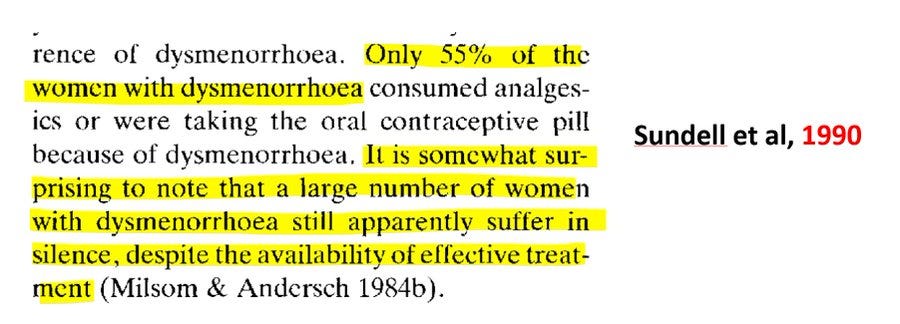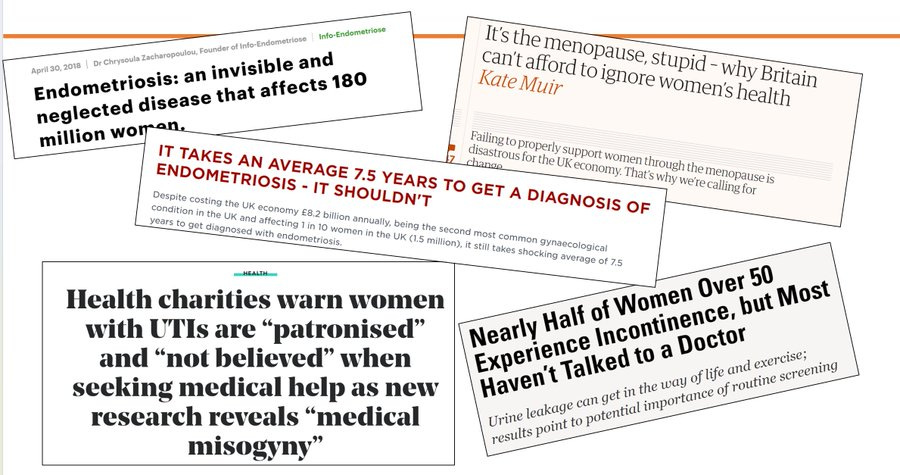For International Women’s Day, I’ve converted a Twitter thread I wrote 18 months ago, highlighting the problems women experience because of their periods & the shameful of lack of research / societal attention on these issues.
*****
The continuing stigma and silence around periods is pathetic, wrong, devastating for women and economically nonsensical. Some facts.
Women of reproductive age are a third of our population (18 million in England!) - most of these women have periods. And periods going wrong is really common!
1 in 4 women experience heavy menstrual bleeding. You often bleed through sanitary products super fast. You bleed onto your clothes, onto furniture. It's *excruciatingly* embarrassing. Many women with heavy bleeding don't leave house during their periods.
1 in 5 (20%) women experience severely painful periods. You can't study or work - often you just want to curl into a ball and stay there forever. Sometimes the pain is so bad, women faint or vomit. Plus between 50%-75% women experience some pain.
Periods change over time. Heavy bleeding & pain peak when your periods start - so when you're a teenager & into early twenties. An important time in a girl's life. Heavy bleeding then rears its ugly head again at menopause with a second peak for women in their 40s.
For some women, pain & heavy bleeding remain terrible throughout adulthood. Often (but not always) the cause is endometriosis, affecting 1 in 10 women. It takes an average of *8* years to be diagnosed - often women are only taken seriously when it affects their fertility.
There are significant barriers preventing women from seeking help. The first is that many women simply don't know what is a normal amount of bleeding or pain - so they don't know when their periods are going wrong. Most think of period pain as something to be endured.
Even if they recognise that they are suffering from extreme bleeding or pain, many women don't know that treatments exist! One study estimated that 1.6m women in Japan suffer severe pain - and that most them are NOT getting guideline treatment.
A paper from *1990* reported that only 55% of women with severe pain took painkillers or the pill for their pain. They thought it *surprising* how many women still suffer in silence without good treatment. This was written OVER THIRTY YEARS AGO. How little has changed.
We still aren't talking about it enough! Stigma prevents women from seeking care. 48% of young UK girls are embarrassed by their periods. We don't talk about it to each other. It's WHY we don't know what's normal or that there are treatments.
Even if we do seek care, women are often not taking seriously. And it's not just period pain - women with the same chest pain symptoms as men take longer to be seen, less likely to receive painkillers & more likely to be diagnoses with anxiety!
And it really matters. Up to a third of girls/young women regularly miss days of school or university. Those who go but in pain do less well. Imagine the impact of missing a few days of school every month? of doing an important exam in excruciating pain?
A US study estimated 600 million working lost every year to period pain. Studies in US & Japan put annual cost at $billions. Lost productivity of women in work but in pain is even higher than that from missing work. Women with heavy bleeding more likely to miss work.
A paper from *1978* said that period pain is the greatest single cause of lost working hours and school days among young women. Think of all the things that have changed in the last 50 years! Women suffering with periods going wrong has stayed the same. It's insane.
There are effective treatments for heavy bleeding - but far too few women access them. For periods - it's painkillers (mainly ibuprofen) or hormonal contraception. Paracetemol only works for about half of women. Ibuprofen better but doesn't work for 25%-40% of women. But about 20% of women can't take ibuprofen for medical reasons. Hormonal contraception is pretty good but doesn't work for about 15% of women. Plus many girls/women don't want to take it for other reasons. Many teens never access it because they don't know - or feel able - to ask.
There are other treatments but they are poorly researched or evidenced. Treatments have not really moved on for 40+ years! One doctor commented that given how bad the pain is where is the research?
One study showed the diseases that primarily affect men are overfunded and those affecting women underfunded. This bias over decades (centuries?) has led to conditions affecting mostly women being neglected. Periods are a prime example!
I did a quick academic literature search. Over the past 5 years, I found over 3,700 papers on sexual dysfunction in men vs fewer than 1,000 papers on menstrual disorders in women. Not OK.
We are at least starting to recognise this! Whether it's periods, menopause, urinary tract infections (the bane of so many women's lives!), urinary incontinence… you name it, we've stigamatised it. We're underresearching it, underdiagnosing it and undertreating it.
And this is all before we talk about period poverty - affecting women here and particularly in low and middle income countries. In many countries, menstruation is key factor in driving girls out of secondary education.
Being embarrassed about periods, taboos for women talking about them, men not wanting to know, has all stopped us researching & treating it. It's wasting women's productivity and potential. Too little has changed in FIFTY YEARS. This has to stop.


















Brilliant. As a woman doctor now retired I agree with everything you write. Women are still being dismissed even when they know perfectly well what their problems are. No wonder they don't seek help when GPs largely dismiss women 'of a certain age' aren't worth listening to.
Thank you so much for writing this.
Thank you for writing this. I moved to the US not long after a unilateral salpingo-oophorectomy, which I had because neither I nor my doctor were confident that my ovary wouldn't keep producing massive cysts (grapefruit sized) and I didn't want my first experience of the US health system to be arranging a major surgery. My periods were extremely painful for a long time after surgery, and my UK doctor prescribed strong painkillers, cocodamol if I remember rightly, which really helped.
But my US doctor nearly refused, because it has codeine in it. He would have refused completely, had I not taken my UK prescription and my Do Not Fuck With Me attitude. As it was, he only give me the one prescription and wouldn't renew it afterwards. I ended up stocking up on Neurofen Plus every time I was back in the UK instead.